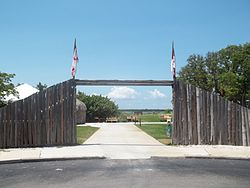De Soto National Memorial
|
De Soto National Memorial
|
|
 |
|
| Location | Manatee County, Florida, United States |
|---|---|
| Nearest city | Bradenton |
| Coordinates | 27°31′26″N 82°38′40″W / 27.52389°N 82.64444°WCoordinates: 27°31′26″N 82°38′40″W / 27.52389°N 82.64444°W |
| Area | 26.84 acres (10.86 ha) |
| Built | 1539 |
| Visitation | 240,172 (2005) |
| Website | De Soto National Memorial |
| NRHP Reference # | 66000078 |
| Significant dates | |
| Added to NRHP | October 15, 1966 |
| Designated NMEM | March 11, 1948 |
De Soto National Memorial, in Manatee County 5 miles (8 km) west of Bradenton, Florida, commemorates the 1539 landing of Hernando de Soto and the first extensive organized exploration by Europeans of what is now the southern United States.
The memorial includes 26 acres (11 ha), where the Manatee River joins Tampa Bay. It has 3,000 feet (910 m) of coastline; eighty percent of the area is mangrove swamp
In May 1539, Hernando de Soto and an army of over 600 soldiers landed in the Tampa Bay area. They arrived in nine ships laden with supplies: two hundred and twenty horses, a herd of pigs, war dogs, cannon, matchlock muskets, armor, tools, and rations. They were executing the order of King Charles V to sail to La Florida and "conquer, populate, and pacify" the land.
The expedition did not yield the gold and treasure these men sought. Instead, they marched from one village to the next, taking food and enslaving the native peoples to use as guides and porters. Hundreds of lives were lost on this calamitous four year, 4,000 miles (6,400 km) journey. The de Soto expedition would change the face of the American Southeast forever, and cause Spain to reevaluate her role in the New World. Ultimately, it was the first hand accounts of survivors, describing the native cultures and the richness of the land, which became the journey's enduring legacy.
The national memorial was authorized on March 11, 1948. As with all historic areas administered by the National Park Service, the memorial was listed on the National Register of Historic Places on October 15, 1966.
The mission of De Soto National Memorial is to preserve the controversial story of this exploration and interpret its significance in American history. Visitors can attend living history demonstrations, try on a piece of armor, or walk the nature trail through a Florida coastal landscape similar to the one encountered by conquistadors almost five hundred years ago.
...
Wikipedia


